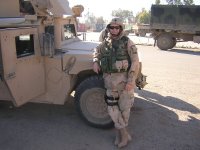Slipping seamlessly back into civilian life does not exactly describe my experience since returning from Iraq. I remembered how to drive a car, operate a washer, look up a statute, turn right on red and ride a bicycle, but I’ve enjoyed odd little hiccups of reentry.
In my absence, my civilian job migrated to another employee, never to return, so I have been learning new job duties at the Idaho Industrial Commission. My military position, Inspector General, was a casualty of the 116th’s reorganization and it vanished, dropping me into a slot for which I’ve not been trained, with duties that have not been explained to me, and with a boss who has not been identified. With these parameters it will be either very easy or impossible to succeed.
These things have changed. I am now easily startled; a ringing phone will accelerate my pulse, and a loud sound will stop it. I get very emotional hearing about injured and killed soldiers, as if I personally knew the victim. When I left Iraq I had a certain fondness for the Iraqi people, but my heart has hardened with each American casualty and I have little good will left for Iraqis. I have much more experience with listening to people explain their problems, but have much less patience for it. I have been strangely reluctant to balance my check book or figure out my monthly finances. Time spent with my children feels incredibly precious.
My memories of Iraq are bright and fresh and yet it seems to have happened a long time ago. I miss being involved in such an important and historic endeavor; the simplicity of the lifestyle (no cooking, no dishes to wash, few choices to make); my fellow soldiers; the way work and personal life were as one. I don’t want to go back, but would if called.
The sky is very blue here, and I’m still waiting for a hot day. It’s great to be back.
Before and after, or then and now, pix below.


13 comments:
Thanks for sharing your experiences. It is a very impactful and interesting message. I also want to thank you for serving our country.
I was happy to share this, and appreciate you reading and commenting. Serving our country is very rewarding, though often physically difficult. I do feel as if I have sacrificed more than most, but also feel proud to have done so. As we say in the Army, "Thank you, sir, for the opportunity to excel!"
Alan-
I am now 18 months home from Iraq - as a Marine Judge Advocate attached to an infantry Battalion on the Syrian border. I read your post, and kept nodding my head in agreement, as I too have felt my heart harden to Iraqis, I still duck when I hear a sudden loud noise. I don't like large groups of people.
My heart breaks when I read about casualties. And it pisses me off that I have to go to dod.mil/releases to see them, because it does not even make the news anymore. And I am pissed at the Administration for their only response being "stay the course." I think by now we could have figured out the "course" isn't leading where we thought it would. Find a new course seems more logical to me. But to do that, we need a new Congress and a new Administration. We'll know about that in November.
But, like you, I was proud to serve my country. I only wish more people felt that way. You would think that there would be a waiting list to sign up for the service, with the way everyone supported this war and says they support the troops.
Anyway, welcome home, and all the best.
- Jed, Albertson College grad, Captain of Marines, Montana resident.
Jed, last night I spent time with my step-son before he deploys to Iraq. Staying the course, without figuring out a more effective plan, doesn't make sense. As they say, "If you keep doing what you're doing, you're going to keep getting what you're getting."
I don't want my step-son to get hurt. Frankly, I think we need to send in more troops, probably 4-5 more divisions (40K-50K more troops), and f*ing TAKE CONTROL of the situation. Casualties suck, but we can't let fear of them dictate a weak policy.
Thanks for the comment. I'll be voting for change in November because I'm tired of feeling so lousy over losing our kids.
I'm with you Alan - taking control is the only way. November is time for us to take control too!
Glad you're getting squared away and things are as good as they are.
My prayers are with Jed to come back safe and sound ~
"my heart has hardened with each American casualty and I have little good will left for Iraqis."____It seems to me to be harsh to blame all the Iraqis for the murdering minority. The Iraqis are suffering far higher casualties from these thugs than the coalition forces are. I think 95% of Iraqis just want peace and quiet and to get on with normal lives. The violent minority seem to be largely either Saddam's former secret police, jailers etc, or militia trained by the Iranian Republican Guard (who are the Iranian equivalent of Saddam's brutes). Don't blame all the Iraqis for this state of affairs.
Interesting take on coming home and adjusting...thanks for sharing it.
Hopefully I too will one day be able to say that I was proud to serve my country.
Thanks to you and Jed both.
Oh, and I might be dropping you a line in a few days over some of the stuff you addressed in this post (sorry so cryptic; it'll make sense once you read the email) so be on the lookout for that.
Incredibly well written. I hate to say I "enjoyed" reading the effect the war had on you, but I did. It's remarkably insightful. By the way, both pictures ought to be in GQ. -Tinkrbellfaerie
Nice post. Glad you are home and hope your job situation stabilizes satisfactorily.
I'm puzzled by your take (and Jed's) on the situation in Iraq. It seems to me the Iraqis ARE taking more control of their own situation every day, and that we are pulling back as they step up.
There should be no illusions the Iraqis will ever approach our level of competence and professionalism, nor should that be the standard expected, or even necessary, for them to accomplish their mission. I was stationed in the middle east a couple of decades ago and know a bit about the mentality of their soldiers and culture, and there's no way they can emulate our standards at this point in their development. They may even take a harsher tack when dealing with hostiles than we are taking; I just hope their tactics prove appropriate for the situation. Main point is, they will be doing it without us.
It seems that going in with more troops and "taking control" would be a hollow and short-term victory. How in the world would we ever extricate ourselves from that situation?
To me, this seems like raising children. We can't do everything for them and tell them everything they must do. We have to let them accept responsibility, make their own decisions, live with the consequences and grow from their experiences.
Einstein said that insanity is doing more of the same thing and expecting a different result.
There is a tendency for conservatives to extend this line of thinking to dangerous places: "If we only get tougher on crime, rather than legalising harmless things people will always do, the crime rate will fall."
The result is the largest per capita prison population in the world, a factory that takes in harmless drug users and petty criminals with 3 strikes, and spits out unemployable, hardened criminals.
"If we only apply more force in Iraq, things will turn around." This is as silly as believing more policing will end drug use or prostitution. More force in Iraq will simply breed more resistance, more hatred of the US around the world, more civilian casualties, more Hadithas and Abu Ghraibs, a further drain on the US treasury, more US military deaths, and more internal instability in Iraq. Was there ever a stable occupied country?
In other words, more of the cause will only result in more of the current consequences. Call it cut and run if you will. The fall of Saigon was cut and run, and some diehards still believe Viet nam could have been won with more troops. But when you're in a hole, stop digging. It's no folly to backtrack on a mistake. The healing in Iraq will only begin when America leaves- even if the short-term result is more instability.
You're allowed to have hard feelings towards Iraqis. Soldiers are trained in the deepest of groupthink: the enemy is not a guy like you just doing what you would do in his shoes: he's an evil, wicked object that threatens what you love, and should be destroyed. Fair enough- that's how soldiers should think. But it also underscores why there's no such thing as a good war.
You can be sure the Iraqis' feelings towards the US are not exactly cordial either.
hello allan...what an interesting blog. while I do not blog myself, I tend to read others from time to time. I am currently deployed a 2nd time to the middle east (I am active duty) and it just amazes what little has changed from last year. The more things change the more it stays the same. Is there an end in sight?
Thanks Alan for all your good work.
I wish the citizens of this country weren't so polarized to the point it negatively affects the morale of the men and women who are entrusted with the safety of this nation. It must be a hallmark of a democracyto bicker while others are in danger.
The sacrifice you, your family and colleagues have made will always be remembered. Medals will never fully recognize you for your time spent in protecting us.
Mike B.
Hi Alan,
I'm currently deployed, and work with Iraqis every day. They don't seem to have the same work ethic we have, but they are friendly, if not a bit reserved with us Americans. I really enjoy working with them. I don't feel any animosity or hardness of heart toward them, even though our FOB gets mortared and rocketed pretty much every day. You have to keep it separate in your mind that there is one group who is doing the attacks and the vast majority of Iraqis just want to live and work and raise their families.
- Theo
Post a Comment